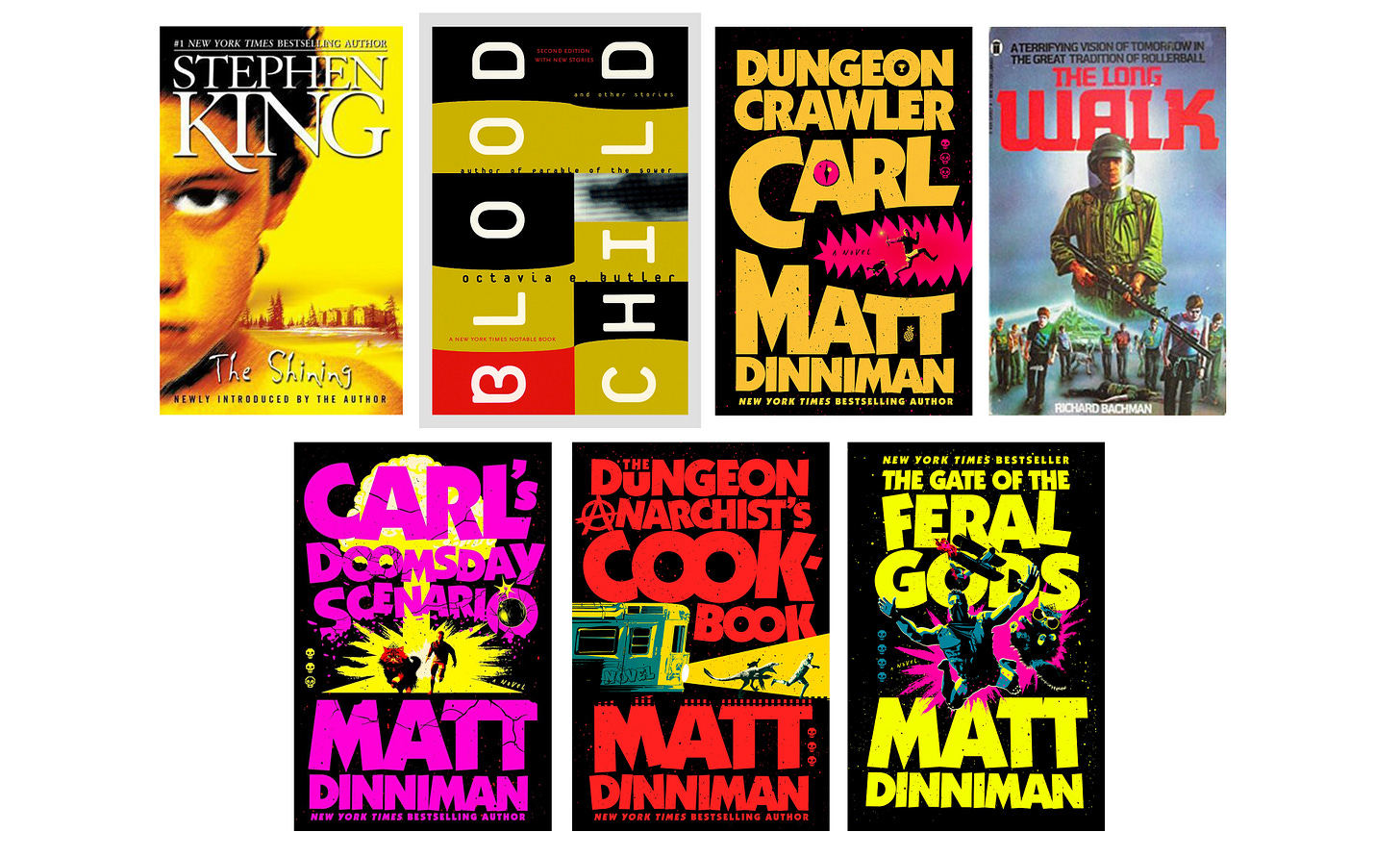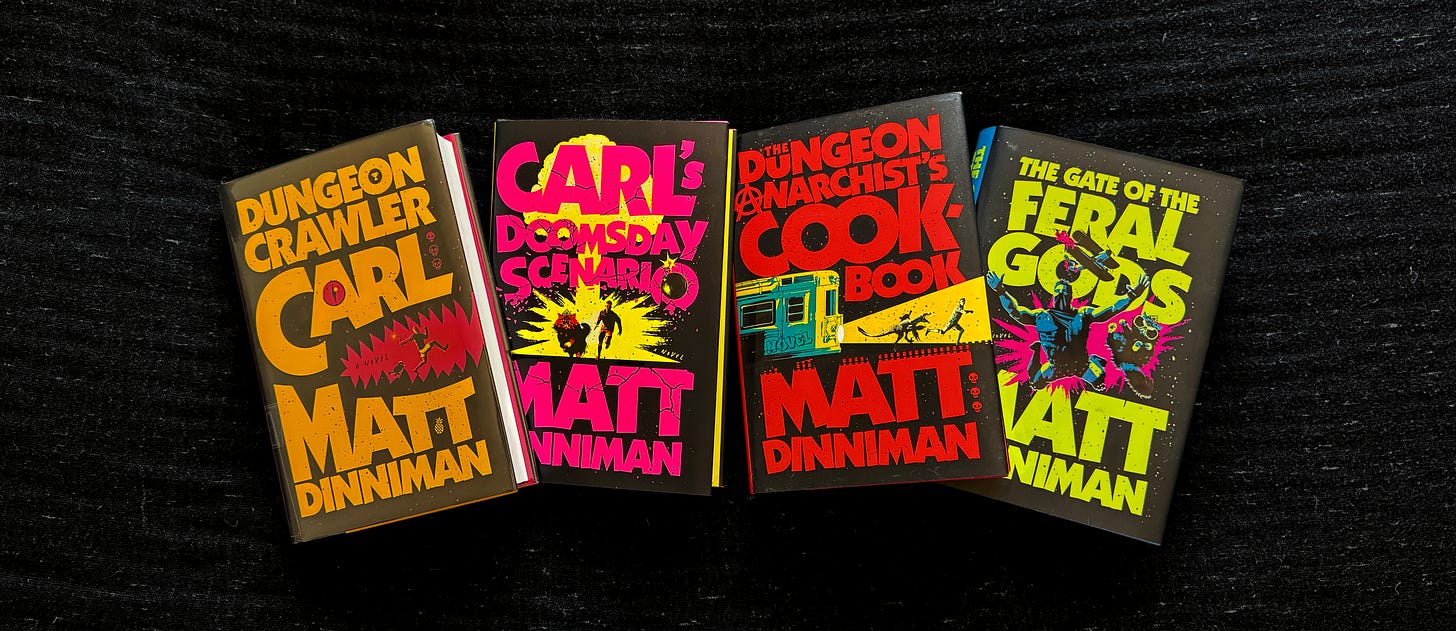What I Read, April and May 2025
A lot of televised, intergalactic death, two King classics (but not both under his name), and Butler's short stories.
I didn’t read much in April. I got a bunch of writing done and the rest of my energy was laser focused on the stress of planning to move back across the country. Which I did! At the end of May, after fighting through a reading slump, my roommate and I drove all my belongings from Phoenix to Connecticut where I’m pausing as I reset my life to get back to NYC soon. Steps are being made in that direction, but we’re not quite there yet.
My reading slump was murdered by a fun-as-fuck LitRPG series, and I also read other good things.
In April and May I read seven books (presented in reading order):
The Shining - Stephen King
I was never a fan of the movie, I have to say. I watched it in my late teens/early 20s when I was committed to backfilling my viewership of horror classics, and having been born and bred on 90s slashers and 80s sci-fi, the slow burn of The Shining did nothing for me. To this day, I don’t think it’s particularly scary.
Here’s what I’ll say about book vs movie and leave it here: They follow the same basic plot structure with the same characters who mostly do the same things, but they’re employed by storytellers to tell very different stories. Each are successful in their unique aims, but despite being aesthetically almost identical, they shouldn’t be compared since they’re each trying to do very different things.
To the book:
This is essentially a haunted house story where an entity is working to recruit an abusive alcoholic father into the hauntings so the entity can kill and absorb the son’s psychic powers. The book is great at employing different visuals and elements for horror ends, and it asks the question of whether a father’s love can overcome generational traumas and violent patterns. I think ultimately the book’s fabulous themes and theses are betrayed by the lackluster final aesthetics (its problem is how the story wraps up, not why it wraps up).
Like I said, it’s very different from the movie, so even if you’re a fan of the film the book is fertile new ground. It’s worth a shot.
Bloodchild and Other Stories - Octavia E. Butler
This is a collection of short stories and essays. All the fiction is excellent, and the non-fiction is perfectly fine - even if they weren’t all for me, they certainly have value.
Some notables:
“The Evening and the Morning and the Night” - I think this is my favorite story of the collection. It has a litany of Butler hallmarks: weird genetic disorders, strict dieting, looming mortality, grief for the living, glimpses of hope via creation in a pessimistic context.
“Speech Sounds” - As one of her most discussed short stories, I had heard a lot about this story before reading it and I didn’t think I was going to like it. But her depictions of fear, chaos, and violence were so visceral, it took a rather inventive concept and made it feel immediate and critical.
“The Book of Martha” - This short story is about Martha, a writer who has an accident and then meets God who grants her the ability to change the world however she wants and live in the new world. This is, to me, one of the most obvious self-inserts and grappling with the job of being a storyteller. It’s fascinating to me to see Butler investigate the challenge of her job in a piece she wrote as a part of that job. It’s even more fascinating to me that she doesn’t mention any of that in her author’s note. Maybe it’s too obvious. Maybe she’s avoiding it. It’s also kind of shocking that Martha dies in a way that’s nearly identical to how Butler died.
Dungeon Crawler Carl - Matt Dinniman
Most of my reading behavior is informed by a wide berth of inputs, but I like to keep my ear to the ground to see what the cis, white, non-gay guys are reading just to get a sense of what’s going on in their world. And sometimes something bubbles up through that community that sounds worth investigating.
Dungeon Crawler Carl is that.
This series started as self-pub and did so well that Penguin bought the non-digital rights to them and is in the process of rereleasing the backlist of the series, and then will release the rest of the series as written.
The straight white men are onto something here! This book is a blast.
I have some sort of ADHD/OCD/Anxiety behavior where I’m constantly doing math when I’m reading: I’m always clocking the page number I’m on and then doing a percentage equation in my head. If it’s a slow book, I do this almost every page. If it’s a good, exciting book, this happens maybe as long as every 10 pages. With DCC 60 pages would pass and I wouldn’t even notice - and I wouldn’t bother to do my little math because I knew the pages were melting away. I ended up reading the 450 page book in two sittings.
As a LitRPG, there’s a TON of world-building and reading of Achievements and Item Descriptions, but as a diehard FromSoft and Skyrim player, I have little friction with this. Non-RPG players’ milage may vary because of this, but there’s a ton of depth here that’s mostly gestured at.
I’m so excited to read the rest of this series. There are dozens of threads planted in this first book, but they’re done effortlessly; many are blink-and-you’ll-miss-it. Like an RPG, it really feels like if you’re paying close attention, there’s a ton of potential for payoff.
The Long Walk - Richard Bachman (Stephen King)
I hate to get all “speechless” but The Long Walk really hit me in ways that are hard to immediately express. I read it in the same “The Bachman Books” collection that I bought to get access to Rage (my favorite King so far and a book that was pulled from publication by King). I found The Long Walk to be impactful in the same way that Rage was: it has a lot of say about what our culture does to young people and how it sets up bait and switches, shell games, and lies that are critical to the way our society functions.
The book’s conceit - 100 young men walk nonstop until there’s only one survivor who receives an amazing prize - has similar DNA to many other popular narratives (Battle Royale, The Hunger Games, The Running Man (also by King, also in this collection), Chain-Gang All-Stars, Dungeon Crawler Carl) but the simplicity of the narrative (it’s just walking, there’s no fighting, no arena, no long list of rules, no explicit socio-political exposition) allows the human drama and meditations on mortality and responsibility and community rise to the surface. Where the fandom of The Hunger Games get distracted by love triangles and arena drama and weaponry and strategies (all aesthetics), The Long Walk is pure death, pain, dread, hope, love, delusion, and self-betrayal. In so many ways, these elements are the foundation on which all in this sub-genre are built. The politics and rules and world-building are tertiary considerations so the reader can focus on the delirium and pedestrian insanity of a situation like The Long Walk.
Also, Trixie Mattel loves this book.
At 255pg, it’s very short for a King novel, and I give it my highest recommendation.
I will say, it will drill deep into you, and you might not even notice the effect it’s had on you until the last 70 pages. So, be careful with this one. Only approach if you’re near or above mental health neutrality.
Carl’s Doomsday Scenario - Matt Dinniman
The Dungeon Anarchist’s Cookbook - Matt Dinniman
The Gate of the Feral Gods - Matt Dinniman
A problem (not THE problem) with reading a propulsive series of which each entry is a mere slice of a larger story is that they blend together. That’s not a dig in the case of the Dungeon Crawler Carl series, but in DCC, each book covers our protagonist(s) fighting through of a floor or two of the game (like a video game level), but every other narrative thread stretches beyond the confines of each book. The separations of the floors, and therefore the books, is more of an aesthetic choice (and sometimes an arbitrary choice) since all the larger narratives span multiple books. Besides “what’s the mystery of this floor” (which sometimes becomes “what are the litany of extreme details of every bit of minutia of this floor”), everything else just continues to run as if the books were all one piece - closer in narrative structure to The Lord of the Rings than The Hunger Games.
Which is why I’m listing these entries together rather than separating them. The distinct aesthetics (like the overarching contextual mystery of Anarchist’s Cookbook (that is preceded by a note from Dinniman not to worry about figuring it out, which makes me try harder!)) are fun to parse through. This was a fun volume of pages to tear through.
A note on the different books: Doomsday Scenario (book two) isn’t quite as good as the first book, and Anarchist’s Cookbook (book three) isn’t quite as good as Doomsday Scenario, but then the enjoyment comes back up for books four and five. Which is to say: if you feel yourself running out of reading steam in book three, just keep pushing.
I’ll also add: There are currently seven DCC books. There’s expected to be around 10 total. Which is a lot! But also, there’s a case for 13. I’ll have a stronger opinion about the potential runway when I’m caught up.
What I’ve learned from DCC: a mystery is not a plot. There’s interest in wanting to see what the result of a mystery is, but that’s different from “what happens.” Demystification isn’t a plot, investigation is.
TBR June 2025 (& beyond)
It’s a few days into June and I’ve already done some reading this month! But…
I was lucky enough that Nic Stone sent me her debut adult novel, Boom Town, which releases in October. Cannot wait.
I plan to read the next two books in the Dungeon Crawler Carl series which would bringh me up to date on the Penguin releases (the seventh is out in self-pub but comes out from Penguin in September, we’ll see how I feel after six).
I have three more books to read in my Year of Octavia E. Butler: Parable of the Sower, Parable of the Talents, and Kindred. Talents is the only one that’s new to me, and while I’m embarrassed that I’m hitting month six of what could have been a three- or four-month project, I want to time these three books intentionally so that my focus and attention are optimized and I don’t sleepwalk through rereads, so they may not get read in June.
The Stand is on deck for Q3, but I might start it early just because it’s such a brick of paper and it might be nice to dip my toe in and see how it feels before plunging in July 1. I also need to read Frankenstein before Del Toro’s adaptation drops in November, so that’s on the radar!





